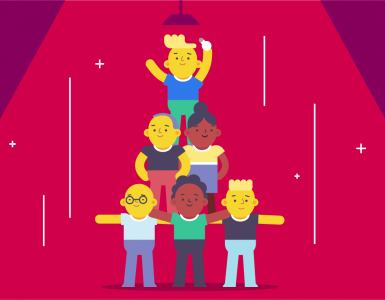Imagine your boss put a salesperson forward for promotion. It can all be motivating until you find out that this salesperson doesn’t have the best performance record compared to other candidates.
Turns out… they spend a lot of time with the boss outside of work.
Favoritism at work is real. You can work hard and always give your best but still get unrecognized just because you’re not a favorite.
Understanding workplace favoritism is key, whether you’re in HR, a leader, or just part of the team. This awkward and unfair situation can tank morale and productivity since employees might feel their hard work doesn’t matter.
Fortunately, the problem can be fixed with the right education. Once you can identify it, you can take the necessary action to ensure better practices are followed in the future.
What is favoritism at work?
One of the obvious signs of favoritism at work is when the boss plays favorites, giving extra perks, promotions, or attention to certain employees not because of their stellar performance but because of personal biases or relationships.
It’s like the workplace version of being the teacher’s pet, except way less cute and way more unfair. Just imagine doing all the heavy lifting while someone else gets the gold star just for hanging out with the boss after hours.
Favoritism at work might not be just a minor annoyance because it can seriously mess with workplace morale and culture. When employees see that hard work and talent aren’t the keys to success, it can lead to frustration and disengagement. Why bother putting in the effort if the rewards go to the boss’s buddy anyway?
How can employees deal with favoritism at work?
So, you’ve spotted favoritism in the office. Now what?
Dealing with favoritism at work can be tricky, but here are some steps to help you navigate this awkward terrain and keep your sanity intact.
Stay professional
First things first, keep your cool. It’s easy to get frustrated or angry, but maintaining professionalism will serve you better in the long run. When someone in the office plays favorites, take a deep breath and focus on handling the situation calmly and rationally.
It’s tempting to vent your frustrations to coworkers, but office gossip can backfire. Not only does it contribute to a toxic work environment, but it can also damage your reputation. Keep conversations about favoritism constructive and focused on finding solutions.
Continue to perform your job duties to the best of your ability. Show up on time, meet deadlines, and participate in team activities. Concentrate on your tasks and performance while it’s easier said than done. Let your professionalism and work ethic shine through, even if it feels like your efforts aren’t being recognized. Stay updated with YouTube trends to find new ways to stay motivated and inspired in your work.
Always stick to the facts. Avoid letting emotions color your observations. For example, instead of saying, “My boss hates me,” say, “On three occasions, my boss assigned high-profile projects to less experienced colleagues.”
Document everything
Whenever you observe an instance of favoritism, note the exact date and time. This helps establish a timeline and shows that favoritism is not a one-time event but a recurring issue.
Look for patterns in the favoritism. Does it happen with certain types of tasks, projects, or in specific situations? Documenting these patterns can help you identify and demonstrate systemic issues rather than isolated incidents.
Write down exactly what happened in each instance. Be specific about the actions or decisions that indicate favoritism. For example, “On July 5th, during the team meeting, the boss assigned the lead role on the new project to John, despite my prior experience and expressed interest.”
You can also include instances where you have gone above and beyond in your role to show your commitment and contrast with the favoritism you’re experiencing.
This clear, factual evidence can support your case when discussing the issue with your boss, HR, or higher management. It is more likely that your concerns will be taken seriously and addressed appropriately.
Communicate
If the issue persists and directly talking to your boss isn’t an option, take your concerns to HR. Frame your concerns using “I” statements to express how favoritism affects you personally without sounding accusatory. This helps to keep the conversation constructive.
For example, rather than saying, “You never recognize my work and always favor John,” say, “I feel overlooked when my contributions aren’t acknowledged, and it impacts my motivation.”
Explain how the favoritism is affecting your work and the overall team morale. Highlight the broader implications, such as decreased productivity or lowered team spirit, to emphasize the importance of addressing the issue.
Don’t forget to always provide specific examples of favoritism rather than making general statements. Refer to your documentation to cite specific incidents, dates, and actions.
Or, you can ask for regular feedback on your performance. This shows your commitment to improvement and also provides a benchmark for your achievements. If possible, request feedback in a written form to create a paper trail of your progress.
Consider your options
If favoritism is deeply ingrained and impacts your career growth, it might be worth considering other opportunities within or outside the company.
If you’ve tried everything you can to deal with it but always come up short, the best move for your career is to find a place where your talents are recognized and appreciated.
To prevent this from happening again, make sure that before applying for a new job, you thoroughly research the company culture and values. Seek out reviews from current and former employees, look for any red flags in how they handle promotions and recognition, and consider asking about their policies on performance evaluation during your interview.
What can HR do with favoritism at work?
It’s HR’s job to make sure that fairness and equity are prioritized in the workplace. To tackle favoritism issues effectively, HR professionals should have policies and practices that promote transparency, meritocracy, and equal opportunities for all employees. Here are some best practices that HR can use to deal with favoritism at work.
Transparent and fair promotion criteria
When promotion criteria are transparent, they are communicated to all employees– so it leaves no room for ambiguity or misunderstanding. If needed, you can create explainer videos to clarify the promotion criteria further so that everyone understands the expectations and processes involved.
This makes sure that every team member understands the expectations and benchmarks they need to meet in order to advance in their career.
Fair promotion criteria are based on objective measures of performance, skills, and qualifications relevant to the role. This means that promotions are awarded based on merit and demonstrated capability rather than subjective factors like personal relationships or favoritism.
When both transparency and fairness are upheld in promotion criteria, employees feel motivated to strive for excellence knowing that their efforts will be fairly recognized and rewarded.
Promote team-building initiatives
Effective team-building initiatives can be activities like team outings, workshops, knowledge sharing, retreats, and collaborative projects. These activities provide opportunities for employees to interact in a relaxed and informal setting, away from the pressures of daily tasks.
When employees participate in team-building exercises, they can learn to appreciate each other’s strengths, build trust, and develop effective teamwork skills.
Not only that– team-building initiatives can help break down barriers between different departments or hierarchical levels within the organization. It would be much easier for employees from diverse backgrounds to collaborate on tasks or solve challenges together. This, in return, will promote cross-functional understanding and alignment towards common goals.
Use workplace surveys
Surveys allow HR to monitor the prevalence of favoritism indirectly. Questions about team dynamics, perceived fairness in decision-making, and trust in leadership can indicate whether favoritism may affect morale or perceptions within the workforce. Patterns or trends in survey responses can highlight areas where further investigation or intervention may be necessary.
Not to mention that workplace surveys also encourage transparency and open professional communication. When employees feel their opinions are valued and confidentially collected through surveys, they are more likely to provide honest feedback.
Allow employees to report favoritism anonymously
Anonymity removes barriers that might prevent employees from speaking up about instances of favoritism.
Knowing that favoritism can be reported anonymously fosters accountability among managers and leaders. It allows them to share their concerns freely without fear of retaliation or bias. All of this will promote a more open and honest workplace culture.
To effectively implement anonymous reporting of favoritism, HR should establish clear guidelines and procedures for employees to submit reports confidentially. This includes providing multiple reporting channels such as anonymous online forms, dedicated hotlines, or third-party platforms.
Key takeaways on favoritism at work
One key takeaway about favoritism at work is that addressing it is a collective responsibility for all community members. When favoritism goes unchecked, it can erode trust, morale, and productivity within the workplace.
Every employee must be proactive in identifying and reporting instances of favoritism, as well as for leaders and HR, to ensure fair and transparent practices.
Can collaboration apps help tackle favoritism? Chanty as a communication tool helps employees discuss concerns and share feedback. The collaboration features allow teams to work together effectively to address and resolve cases of favoritism.









Add comment